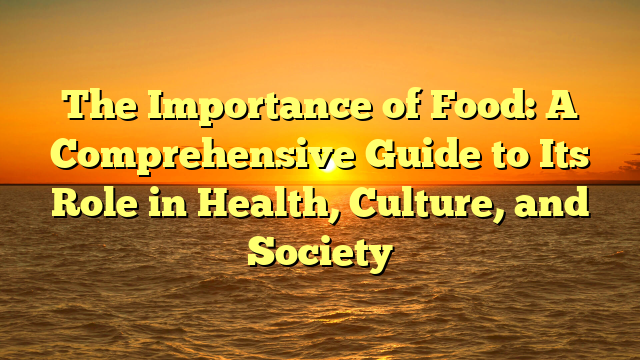
Food is more than just a necessity for survival; it is an essential part of human life that
shapes cultures, economies, and individual well-being. Our relationship with food is
multifaceted, as it impacts not only our physical health but also our emotional state, social
connections, and cultural identities. In this article, we will explore the various roles that food
plays in our lives, including its nutritional value, cultural significance, and economic
importance.
1. Nutritional Value: Fuel for the Body
The most fundamental role of food is its provision of essential nutrients needed for the body
to function properly. The human body requires a variety of nutrients—such as proteins,
carbohydrates, fats, vitamins, and minerals—to maintain energy levels, repair cells, and
support growth. A balanced diet that includes a variety of foods ensures that the body
receives these nutrients in the appropriate proportions.
Macronutrients
Macronutrients—proteins, fats, and carbohydrates—are the primary sources of energy for
the body. Proteins, found in meat, fish, eggs, and legumes, are crucial for tissue repair,
immune function, and enzyme production. Carbohydrates, found in grains, fruits, and
vegetables, serve as the body’s main energy source, fueling physical activity and brain
function. ketuaslot , which can be derived from oils, butter, nuts, and seeds, provide energy and
help with the absorption of fat-soluble vitamins like A, D, E, and K.
Micronutrients
Micronutrients, including vitamins and minerals, are needed in smaller amounts but are just
as important for maintaining good health. These nutrients are involved in various bodily
functions, such as immune system support, bone health, and wound healing. For instance,
calcium is vital for strong bones and teeth, while vitamin C supports immune function and
skin health. A deficiency in micronutrients can lead to a range of health issues, from scurvy
(lack of vitamin C) to anemia (lack of iron).
2. Food and Health: A Connection Beyond Nutrition
While food provides the necessary building blocks for physical health, its impact on our
well-being extends beyond just nourishment. Our dietary choices can influence our mental
health, emotional state, and overall quality of life.
The Role of Food in Mental Health
Emerging research suggests that what we eat can have a profound effect on our mood and
cognitive function. For instance, a diet rich in fruits, vegetables, whole grains, and lean
proteins has been linked to lower rates of depression and anxiety. These foods are packed
with antioxidants, omega-3 fatty acids, and other nutrients that support brain health.
Conversely, a diet high in processed foods, sugar, and unhealthy fats can contribute to mood
swings, fatigue, and even mental disorders like depression.
The Emotional Connection to Food
Food is also tied to emotions. Many people turn to food for comfort during times of stress,
sadness, or happiness. This emotional connection to food can lead to overeating, unhealthy
eating habits, or disordered eating behaviors. Additionally, food can evoke memories of
family gatherings, celebrations, and cultural traditions, creating a sense of comfort and
nostalgia. Thus, food serves as both a source of physical nourishment and emotional
support.
3. Food and Culture: A Global Bond
Food plays an integral role in shaping and expressing cultural identities. Each culture has its
own unique cuisine, often shaped by geography, climate, history, and available resources.
From the spicy curries of India to the pasta dishes of Italy, food reflects the values, traditions,
and history of the people who prepare and consume it.
Culinary Traditions and Cultural Heritage
Food is deeply embedded in cultural practices and rituals. Many societies have specific
foods associated with celebrations, such as turkey on Thanksgiving in the United States or
mooncakes during the Mid-Autumn Festival in China. Traditional cooking methods, such as
barbecuing, fermenting, and baking, are passed down through generations, preserving
cultural heritage.
Moreover, food can be a means of expressing social and family bonds. Shared meals bring
people together, fostering a sense of community. The act of cooking and dining together can
strengthen relationships, create a sense of belonging, and provide comfort and security. In
many cultures, the family meal is considered a sacred time to connect and share
experiences.
Globalization and the Exchange of Cuisines
In today’s globalized world, food has become a powerful tool for cultural exchange. People
are no longer limited to the foods of their own culture but can experience the diverse
cuisines of other regions. Restaurants offering international dishes are common in most
major cities, and home cooks often experiment with recipes from around the world. This
exchange of culinary traditions fosters understanding and appreciation of different cultures
while enriching our diets and expanding our palates.
4. The Economic Impact of Food
The food industry is a major driver of the global economy. From agriculture and food
production to retail and hospitality, the food sector generates billions of dollars in revenue
each year and provides employment to millions of people worldwide.
Agriculture and Food Production
At the heart of the food industry lies agriculture, which involves the cultivation of crops and
raising of animals for food production. The agricultural sector supports the livelihoods of
farmers, laborers, and rural communities, and it contributes to economic development,
particularly in developing countries. The demand for food continues to grow with the
increasing global population, making agriculture a key player in addressing food security.
Food Retail and Hospitality
The retail and hospitality industries also benefit significantly from the food sector.
Supermarkets, restaurants, and food delivery services are essential components of the
global food supply chain. As consumer preferences shift toward convenience and healthier
eating options, businesses are adapting by offering ready-to-eat meals, organic products,
and plant-based alternatives.
5. Sustainability and the Future of Food
As the global population grows and climate change threatens food security, the sustainability
of food production has become a pressing issue. To feed future generations, we need to find
ways to produce food that is both nutritious and environmentally sustainable. Innovations in
agriculture, such as vertical farming, lab-grown meat, and plant-based alternatives, hold
promise for reducing the environmental impact of food production while meeting the
nutritional needs of people worldwide.
Conclusion
Food is much more than just sustenance. It is an essential part of our physical health,
emotional well-being, cultural identities, and economies. As we continue to navigate the
challenges of the modern world, it is crucial to remember the importance of making mindful,
healthy food choices and to appreciate the rich cultural heritage that food represents. The
role of food in our lives will continue to evolve, but its significance remains undeniable.




